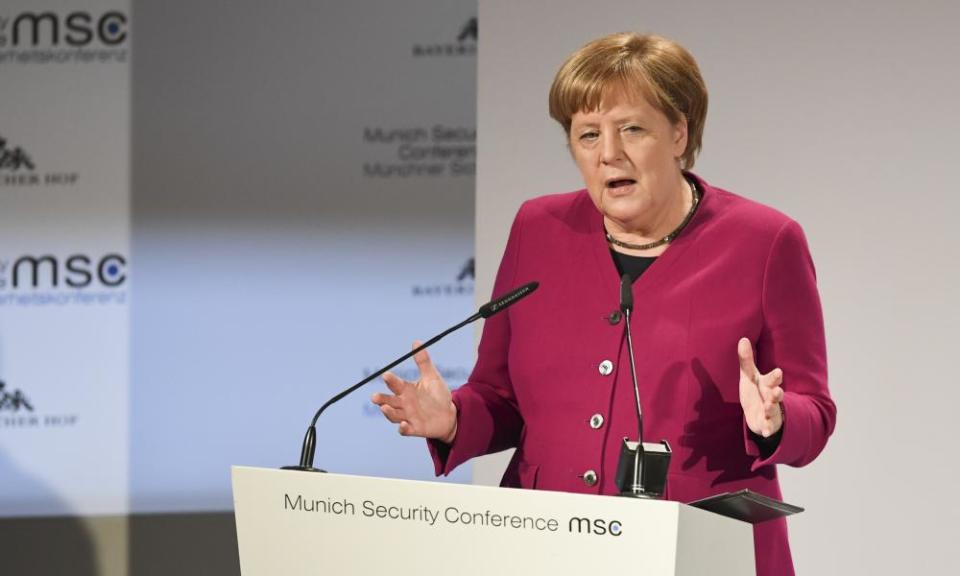Angela Merkel criticises US isolationism, urging 'win-win solutions'

Angela Merkel has turned her fire on America’s “home alone” policies, saying multilateral bodies cannot simply be smashed up, and warned the US president, Donald Trump, that Europe must not be excluded from discussions on future nuclear disarmament, Syria or trade.
Warning of a collapse of the international order into tiny parts, the German chancellor said: “We cannot just smash it. We need to cooperate.”
Merkel quoted the US Republican senator Lindsey Graham as saying: “Multilateralism may be complicated, but it’s better than simply staying at home alone.”
“Now that we see great pressure on the classic order we are used to, the question now is: do we fall apart into pieces of a puzzle and think everyone can solve the question best for himself alone?” Merkel said, adding that it’s better to “put yourself in the other’s shoes ... and see whether we can get win-win solutions together”.
She was speaking at the Munich security conference on Saturday, immediately before the US vice-president Mike Pence, who insisted: “America first never meant America alone.”
Pence repeatedly challenged Europe, saying it was time to pull out of the Iran nuclear deal and accusing Iran of trying to commit a fresh Holocaust. He also demanded the EU step forward for freedom and recognise Juan Guaidó as the sole legitimate representative of Venezuela.
In an uncompromising speech, he also called on Germany to increase its defence spending, and abandon its plan to build a new gas pipeline from Russia – Nord Stream 2.

In Merkel’s speech, punctuated by warm applause largely absent from Pence’s address, the outgoing chancellor effectively challenged Trump’s world vision with a practical, point-by-point rebuttal of nationalist isolationism.
She revealed that Germany is shocked when it hears the US administration describe German BMWs as a threat to US national security, pointing out the largest BMW car plant was not in Bavaria, but South Carolina, supplying cars to China. “We are proud of our cars and we are allowed to be that. Frankly, if you have a problem, if you have a headache, it is better to come and talk about it,” she said.
The US Department of Commerce is due to decide shortly if tariffs should be imposed on German cars.
Merkel also challenged Trump on his unilateral decision to immediately withdraw US troops from north-west Syria, asking whether the policy will strengthen Russia and Iran’s hand to influence the situation on the ground.
Merkel said she was criticised every day over her support for the Iran nuclear deal, but asked whether it was helpful to the west’s common goal of containing Iran’s wider negative behaviour, including in Yemen, “to cancel the only existing agreement with Iran, or it is a small lever to maintain pressure on other issues? This is a tactical question.”
She urged the US not to decide alone on a possible troop withdrawal from Afghanistan. It took a lot of effort to convince the German public about the Afghanistan Bundeswehr mission, she explained, adding a US withdrawal might force a German withdrawal due to the integration of forces.
The German government decided a few days ago to extend the mission by one year, a decision that will be put to the Bundestag in March. Almost 1,300 German soldiers are currently stationed in the Hindu Kush, north Afghanistan.
Discussing the Russian and American decision to cancel the 1987 intermediate-range nuclear forces treaty (INF), she said: “Disarmament is something that concerns us all, and where we would, of course, be delighted if such talks were held not just between the United States, Europe and Russia, but also with China.”
She accepted the US justification for pulling out of the INF this month in response to Moscow’s deployment of the 9M729 missile. The move prompted Russia to announce its own withdrawal, something that will greatly effect European security.
While blaming one another for the treaty breakdown, both Washington and Moscow have also voiced concern that the INF – a bilateral treaty between the US and Russia – does nothing to constrain the rapidly growing military power of China.
According to a new report by the International Institute for Strategic Studies, up to 95% of China’s arsenal of ballistic and cruise missiles would be in breach of the INF if Beijing were party to it.
Merkel defended levels of German defence spending, saying it was due to reach 1.5% by 2024, well below the 2% target set collectively by Nato, the transatlantic defence alliance. “For us, it is very much an essential big step forward.”
She also queried spending measured against GDP as the best reference point for judging defence spending, adding that European development spending in Africa also brought greater security, by providing jobs that reduced the impulse of African youth to migrate to Europe.
Merkel urged Trump to understand the importance of Nato as a symbol of something deeper than security. “We have to think in networked structures. The military component is one of them. We need Nato as a stability anchor in stormy times. We need it as a community of values.”

 Yahoo News
Yahoo News 